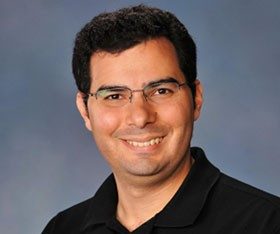Chris Goldsmith, Ph.D.

Chris Goldsmith
Associate Professor
Auburn University
A.B., Harvard University, 1998
Ph.D., Stanford University, 2004
Chris Goldsmith received his Ph.D. in inorganic chemistry in 2004. He joined the faculty of Auburn University (Auburn, AL) six and a half years ago, after completing a postdoctoral fellowship. In his current position, he leads graduate student research and teaches courses in general and inorganic chemistry. Goldsmith entered graduate school immediately after receiving his bachelor's degree.
Now, he leads a research group at Auburn that studies the redox chemistry associated with main group and transition metal complexes. One project aims to develop magnetic resonance imaging (MRI) contrast agents that can detect reactive oxygen species. A successful sensor would be able to image regions of oxidative stress within the body in a non-invasive manner.
This work is highly cross-disciplinary: Goldsmith's group collaborates with spectroscopists in Auburn’s Department of Chemistry and Biochemistry and in the Auburn University MRI Research Center. They also have collaborators in Auburn’s College of Veterinary Medicine.
Other projects involve developing cheaper, cleaner, and more selective catalysts for oxidation reactions. The catalysis projects involve a great deal of inorganic and organic chemistry — some of their catalysts are loosely inspired by enzymes. In this research, they work with spectroscopists and kineticists within Auburn’s Department of Chemistry and Biochemistry.
It is easy to get caught up with a research fad, only to find yourself competing with dozens of other research groups for the same results. However, if you really believe in a project, you can make it into its own hot area with hard work and thoughtful presentation.
Typical day on the job:
Various aspects of my job include:
- Preparing lecture notes and teaching classes, and gradings problem sets, exams, and papers.
- Meeting with my lab group to discuss their research, and preparing and submits research manuscripts for publication.
- Reviewing eviews the recent literature and brainstorms research ideas.
- Preparing and submitting grant proposals to fund my projects. I also peer-reviews manuscripts and grant proposals submitted by other researchers.
- Preparing and presenting invited and contributed seminar presentations.
- Networking with other scientists and serving on committees at the department, college, and university levels, in addition to my outreach work for the university and for ACS.
The exact composition can vary quite extensively. Some days might be focused entirely on preparing materials for a class; other days may demand full devotion to a manuscript.
Work environment:
I work largely in an office. My research group is in a room downstairs from me. My research group and I are the sole occupants of those spaces. My lab contains a gas chromatograph instrument, a nitrogen atmosphere glove box, a bench-top cryostat, an electrochemistry station, a UV/vis spectrophotometer, and fume hoods equipped with nitrogen/vacuum lines.
Work schedule:
I work approximately 60–65 hours per week. The hours are fairly flexible. I'll do some work at night or during the weekend, but I don't really think of such efforts as "working overtime." The environment is relatively fast-paced.
Travel schedule:
1–5 days. Every year, I try to go to either one or two national conferences, where I’ll present my lab group’s latest research, attend talks given by colleagues in my fields, and network. These are good opportunities to catch up with people, learn about new research directions, and share best practices in teaching, outreach, and research. Additionally, I’ll occasionally visit and give seminars at other chemistry departments.
Tools you can’t live without:
Much of my current work revolves around presentation, specifically the preparation of lectures, posters, and manuscripts. Consequently, Microsoft Word, Microsoft Powerpoint, and Endnote are essential. I also make heavy use of the graphing program Kaleidagraph and Chemdraw. I use Microsoft Outlook and the web browser Firefox for communication and seeking information.
What you like most about your job:
I enjoy the freedom to research what interests me. I also enjoy the interactions with the students in my lab group and classes.
Best productivity trick:
My best trick for being productive is to simply just sit down and do the work. Once I start a task, I don't have any difficulty focusing on it.
Best career advice you’ve received:
My graduate advisor once noted that one of his friends became a success by "sticking to his guns." It is easy to get caught up with a research fad, only to find yourself competing with dozens of other research groups for the same results. However, if you really believe in a project, you can make it into its own hot area with hard work and thoughtful presentation.
Skills or talents that make you a good fit for your job:
I am very well organized. It helps me manage the large variety of duties that comes with the job.
Essential habit you wish you’d started earlier:
Reading the literature every week. I started doing this early in graduate school, but I wished that I had started as an undergraduate. There are some days when I feel that I'm still catching up to our field's past.
Favorite ACS resource:
SciFinder is extremely useful for much of what I do. I find that knowing how to search for information is usually greater knowledge than the information itself.
How you've benefited from being an ACS member:
The networking is very useful. I've met some great people at conferences and through local section activities.

